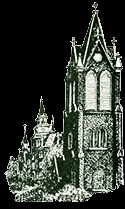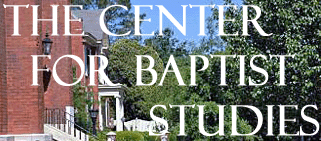|
Encouraging scholarship, strengthening faith identity, and interpreting contemporary issues in Baptist life. |
||
 |
|
America's First Freedom |
|
Home • Staff • Local Church • News & Views • Issues • Bulletin • Conferences / Seminars • Sabbaticals • Certificate • Links |
||
|
As we Americans celebrate our political freedom today, it’s surely appropriate also to revisit our first freedom, religious freedom. Too quickly we forget that it was the desire for religious freedom that motivated our ancestors to seek these shores. They wanted to 'get government off their back' so the soul could be free to relate to God as it would. And too easily we forget that at least some of our founding fathers understood religious freedom as being the initial and essential freedom.
In 1789,
while the Constitutional Convention was in session in
I don’t
believe it was coincidence that
It is a God-given right, actually - for the soul, the conscience, the religious faculties of a person to be free. Holy scripture tells us God grants such liberty to each person, for within the Bible there is no such thing as coerced, mandatory faith. The only faith our Bible acknowledges as valid is freely chosen faith. The Bible asks for trust, for love, for worship from the heart…and these cannot be procured by threats or compulsion. And whenever in human history a government has attempted to mandate or orchestrate religious observances, trouble has followed.
So it is
not surprising that
Unfortunately, it is a freedom that is in jeopardy today. Voices now are being raised - and, regrettably, many of them are Baptist voices - demanding that government get back into the religion business. Take, for an example, the frequently heard complaint that it was wrong for the government ever to have ruled against school prayer. Actually, what the government did was to remove socially obligatory, or mandatory prayers from the schools. As such, the court’s action was a wonderful plus for true religion, for it recognized that prayer is a religious act of faith entered into willingly by sincere seekers of God; and that it demeans prayer to treat it as an expected religious ritual of cultural unity. Prayer is ‘different,’ prayer is a theological, religious matter occupying a special zone in which government has no place. And lovers of freedom need to raise the question, “Do we really want the government telling any of us when and where and how to pray?”
Americans are justifiably concerned toady about our values, a concern some
politicians regrettably feed upon, playing the religious card as
skillfully as their predecessors played the race card.
In our post 9-11 anxiety Americans understandably want cohesion and
moral/religious unity, and some seem to want it so fervently that they’d
like everyone quite literally to
‘sing
out of the same hymnbook.’
It was a desire our founding fathers also felt, but wisely
rejected. The principal figure on that occasion was
Patrick Henry, of “Give
me liberty or give me death”
fame. Five years before the Bill of Rights was passed
Patrick Henry tried to get the
The 146th Psalm, which we read earlier in this hour, is actually a political song. It contrasts the impressive stature of princes and potentates who have power for only a season - and in whom it is folly to place much trust - it contrasts these governmental powers with the everlasting God whose program of justice and mercy endures forever. The Psalm says we ought not confuse the two, nor even place them on a par. They are different. On this Fourth of July I am proud to be an American. Even when I am profoundly displeased, embarrassed or enraged by actions or policies of my nation, I am proud to be an American. But I am prouder to be a Christian - I hope - and grateful to be so in a nation that has always recognized the eternal and essential difference between God and government. I pray that we always will. Eternal God, we come now to the table of our Lord Christ. It is not a national table, not an American table, but the table of Him who lived and died and reigns in glory for all people of all nations. We come to a table set for sinners, a table prepared for those who know they need help. We thank you for the freedom to come, for the provisions made for us before the foundations of the world, for your promises to meet us here and lift us above our narrow partisanships. Here we would be made one with the crucified Jesus in whom there was no hidden agenda, no ego-needs, no political power, no power save love. May we be freed to love as he loved, and to live as he lived. Amen.
The
quote, and other borrowings for this sermon come from Edwin S.
Gaustad’s
Proclaim
Liberty Throughout All the Land: A History of Church and State in
|
||
|
The Center for Baptist Studies, Mercer University, 1400 Coleman Avenue, Macon, GA 31207 Phone (478) 301-5457 |
||
